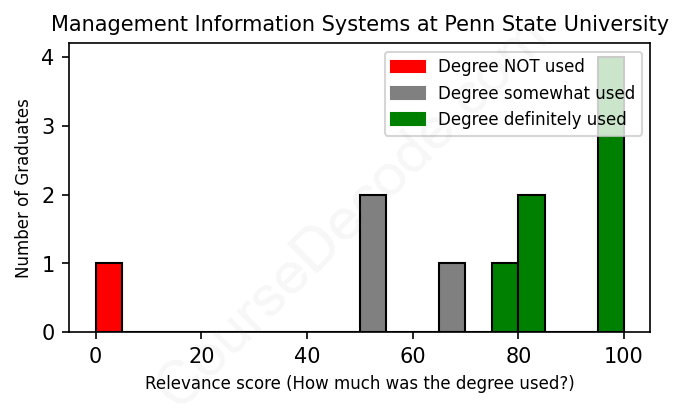
First, some facts. Of the Management Information Systems graduates from Penn State University we've analyzed , here's how many have used (or NOT used) their degree in their career:

These are estimates based on AI analysis of 11 LinkedIn profiles (see below).
The verdict? Above average. Overall, with an average relevance score of 73%, Management Information Systems graduates from Penn State University have a higher likelihood (+6%) of finding work in this field compared to the average graduate across all fields:
And for comparison, here's the chart for all profiles we've looked at across all degrees.
Also, after graduating, only 18% of these graduates have pursued further education other than another Bachelor's degree (such as a Masters degree or other), compared to the average across all profiles of 35%. This suggests a Bachelors degree is enough for most Management Information Systems graduates, and it's normal to look for work straight after graduation.
See the details:
|
Relevance score: 81% We think this person has gone into a career highly relevant to their degree. We think this person has gone into a career highly relevant to their degree.
DEGREE INFOGraduated in 2021 from Penn State University with a Bachelor's degree in Management Information Systems. No other secondary education since. JOB HISTORY SINCE GRADUATIONSanction Screening Analyst Strategic Management Services Sep 2021 - Oct 2022 Management Consultant  Herren Associates Oct 2022 - Present ABOUTNo information provided. |
The top 10 most common jobs done by the graduates we've analyzed (ranked most common to least) are:
People who earned a degree in Management Information Systems from Penn State University have landed in a variety of job roles, with a significant number gravitating towards positions in risk management, data analytics, and information technology. Many graduates have worked at firms like Consumer Portfolio Services and EY, where roles such as Risk Analytics Manager and Technology Risk require a strong understanding of information systems to manage risks and analyze data effectively. This shows a clear trend towards jobs that align well with the skills gained through their studies.
However, not every job these graduates have taken is directly related to Management Information Systems. For example, some have ventured into more general business roles like Program Manager or even positions unrelated to tech, like Assistant Coach. While there are opportunities to utilize analytical skills in these positions, they don’t necessarily tap into the technical depth that the degree offers. All in all, while many graduates do find roles that are relevant to their degree, it's mixed, and some end up in positions that utilize only some of the skills they learned.
Here is a visual representation of the most common words in job titles for Management Information Systems graduates (this is across all Management Information Systems graduates we've analyzed, not just those who went to Penn State University):

Looking at the career trajectories of Penn State graduates in Management Information Systems, it's pretty clear that many of them are doing well in fields that relate directly to their degrees. Right after graduation, a lot of these folks start off in roles like IT Internships, Technology Analysts, or Help Desk positions. These early jobs typically help them gain critical skills and real-world experience, leading to more advanced positions down the line. For instance, a graduate from 2011 climbed from being an IT Specialist to becoming a Vice President of Risk Management after consistently moving up in the same company. This kind of progression isn't unusual and speaks to how MIS grads often leverage their early roles into significant managerial positions.
If you look a bit further down the line, like 5 to 10 years later, many graduates transition into higher-level roles such as Technology Risk Managers, Senior Analysts, or even Consulting positions. This can be seen with multiple graduates staying within companies like EY and XLA, where they scale the ranks quickly. Overall, it seems like a large number of these graduates have turned their studies into successful, meaningful careers tied to Management Information Systems. So, if you're thinking about pursuing this path, it looks like a solid option with a lot of potential for growth!
Getting a Bachelor’s degree in Management Information Systems (MIS) at Penn State can be a bit of a mixed bag, honestly. It’s definitely not the easiest degree out there, but it's also not the hardest. You'll need to juggle some technical courses, like programming and databases, along with business classes, which means you've got to be comfortable with both numbers and concepts. The workload can be demanding, especially with projects and team assignments, but the material is typically engaging if you like tech and business. If you stay organized and don’t procrastinate, you’ll probably find it manageable, but you should be ready to put in some effort!
Most commonly, in the LinkedIn profiles we've looked at, it takes people 4 years to finish a Bachelor degree in Management Information Systems.
Alright, so looking at these Penn State grads, it seems like they've landed some pretty solid jobs after graduation, which usually means good money in the management information systems field. For example, the 2011 grad climbed straight to VP of Risk Management, which definitely suggests they’re making bank now. The more recent grads, like those from 2021 and 2022, are also starting off in roles like Management Consultant and Cyber Security Consultant, which are known to pay pretty well. Even the folks who are just getting started, like the ones from 2023, are getting into roles that typically lead to decent pay. Overall, it looks like these guys are on a pathway to make decent cash, especially as they gain more experience in their careers!
Here is a visual representation of the most common words seen in the "about" section of LinkedIn profiles who have a Bachelor degree in Management Information Systems (this is across all Management Information Systems graduates we've analyzed, not just those who went to Penn State University). This may or may not be useful:

Here are all colleges offering a Bachelor degree in Management Information Systems (ordered by the average relevance score of their Management Information Systems graduates, best to worst) where we have analyzed at least 10 of their graduates:
| College | Score | Count |
|---|---|---|
 The University of Alabama The University of Alabama
|
93 | 18 |
 The University of Georgia The University of Georgia
|
84 | 12 |
 University of South Florida University of South Florida
|
83 | 10 |
 University of Alabama University of Alabama
|
83 | 19 |
 San Jose State University San Jose State University
|
79 | 16 |
 University of Maryland Baltimore County University of Maryland Baltimore County
|
79 | 10 |
 University of Georgia - Terry College of Business University of Georgia - Terry College of Business
|
77 | 18 |
 University of Arizona University of Arizona
|
76 | 14 |
 Penn State University Penn State University
|
73 | 11 |
 Ohio University Ohio University
|
73 | 10 |
 Oklahoma State University Oklahoma State University
|
73 | 17 |
 Baylor University Baylor University
|
73 | 12 |
 University of Houston, C.T. Bauer College of Business University of Houston, C.T. Bauer College of Business
|
73 | 20 |
 Texas A&M University Texas A&M University
|
70 | 10 |
 The University of Texas at Austin The University of Texas at Austin
|
68 | 12 |
 University of Houston University of Houston
|
68 | 19 |
 East Carolina University East Carolina University
|
64 | 11 |
 Washington State University Washington State University
|
64 | 14 |